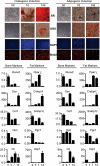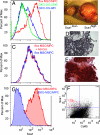Metastatic osteosarcoma induced by inactivation of Rb and p53 in the osteoblast lineage
- PMID: 18697945
- PMCID: PMC2575280
- DOI: 10.1073/pnas.0805462105
Metastatic osteosarcoma induced by inactivation of Rb and p53 in the osteoblast lineage
Abstract
Mutation of the RB-1 and p53 tumor suppressors is associated with the development of human osteosarcoma. With the goal of generating a mouse model of this disease, we used conditional and transgenic mouse strains to inactivate Rb and/or p53 specifically in osteoblast precursors. The resulting Rb;p53 double mutant (DKO) animals are viable but develop early onset osteosarcomas with complete penetrance. These tumors display many of the characteristics of human osteosarcomas, including being highly metastatic. We established cell lines from the DKO osteosarcomas to further investigate their properties. These immortalized cell lines are highly proliferative and they retain their tumorigenic potential, as judged by their ability to form metastatic tumors in immunocompromised mice. Moreover, they can be induced to differentiate and, depending on the inductive signal, will adopt either the osteogenic or adipogenic fate. Consistent with this multipotency, a significant portion of these tumor cells express Sca-1, a marker that is typically associated with stem cells/uncommitted progenitors. By assaying sorted cells in transplant assays, we demonstrate that the tumorigenicity of the osteosarcoma cell lines correlates with the presence of the Sca-1 marker. Finally, we show that loss of Rb and p53 in Sca-1-positive mesenchymal stem/progenitor cells is sufficient to yield transformed cells that can initiate osteosarcoma formation in vivo.
Conflict of interest statement
The authors declare no conflict of interest.
Figures




References
-
- Kansara M, Thomas DM. Molecular pathogenesis of osteosarcoma. DNA Cell Biol. 2007;26:1–18. - PubMed
-
- Malkin D. p53 and the Li-Fraumeni syndrome. Cancer Genet Cytogenet. 1993;66:83–92. - PubMed
-
- Bell DW, et al. Heterozygous germ line hCHK2 mutations in Li-Fraumeni syndrome. Science. 1999;286:2528–2531. - PubMed
-
- Tsuchiya T, et al. Analysis of the p16INK4, p14ARF, p15, TP53, and MDM2 genes and their prognostic implications in osteosarcoma and Ewing sarcoma. Cancer Genet Cytogenet. 2000;120:91–98. - PubMed
Publication types
MeSH terms
Substances
Grants and funding
LinkOut - more resources
Full Text Sources
Other Literature Sources
Molecular Biology Databases
Research Materials
Miscellaneous

